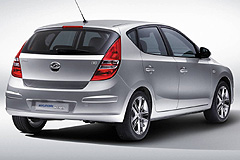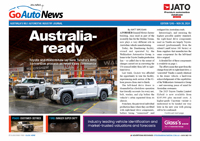Make / Model Search
News - HyundaiHyundai models safer than everStable: Hyundai's petrol and diesel i30 range now comes standard with ESC. Free and standard stability control to triple the take-up of ESC in Hyundai models23 Dec 2008 HYUNDAI estimates that more than 75 per cent of its vehicles sold in Australia during the fourth quarter of 2008 will be fitted with potentially life-saving electronic stability control (ESC) systems – up from just 25 per cent in the first quarter of this year. The significant increase is partly due to the standard fitment of ESC, which Hyundai calls ESP, across its entire i30 small car range in October, and an end-of-financial-year campaign held in May and June, when private Getz, Elantra and Tucson buyers were offered free ESC. “To ensure the retail offer succeeded, we executed a rigorous training program for our dealer sales teams, as well as investing in a major television campaign as well as other media,” said Ben Hershman, the senior manager of product communications and public relations at Hyundai Motor Company Australia.  “We were encouraged by how well the retail program performed for us and this gave us added impetus to progress with adding ESP stability control incorporating traction control system (TCS) across many of our 2009 models.” The 2009 i30 ESC upgrade in October was accompanied by the fitment of Euro 4 emissions-compliant petrol engines across the range, and resulted in price increases of $400 for the entry-level i30 SX and mid-range i30 SLX petrol and diesel variants, and a $50 price increase for the flagship petrol-only i30 SR variant, which already came standard with ESC. “We acknowledge that where these safety features were added as standard items, we had to increase the RRP, as it was unrealistic for HMCA to absorb the whole cost,” said Mr Hershman. ESC is now standard across Hyundai’s entire 2009 model range in Australia, excluding its least expensive Getz S light-car (in which it is an option as part of a ‘Protectz’ safety pack that also includes ABS), the petrol-engined iMax people-mover and the iLoad commercial van - turbo-diesel CRDi versions of which offer it as an option. “Our belief is that we have taken some significant steps forward to make ESP stability control available to the Australian motoring public where other brands have not,” said Mr Hershman, who added that Hyundai’s other major 2008 offensive was the rollout of CRDi turbo-diesel engines at “realistic” ($2000 to $2500) price premiums over their petrol siblings. Read more:Sydney show: Hyundai's wagon taleMelbourne show: Hyundai gets coupe (and diesel) crazy First drive: Hyundai i30 guns for small-car gold First drive: Sonata CRDi sings Hyundai diesel tune |
Click to shareHyundai articlesResearch Hyundai Motor industry news |









Facebook Twitter Instagram